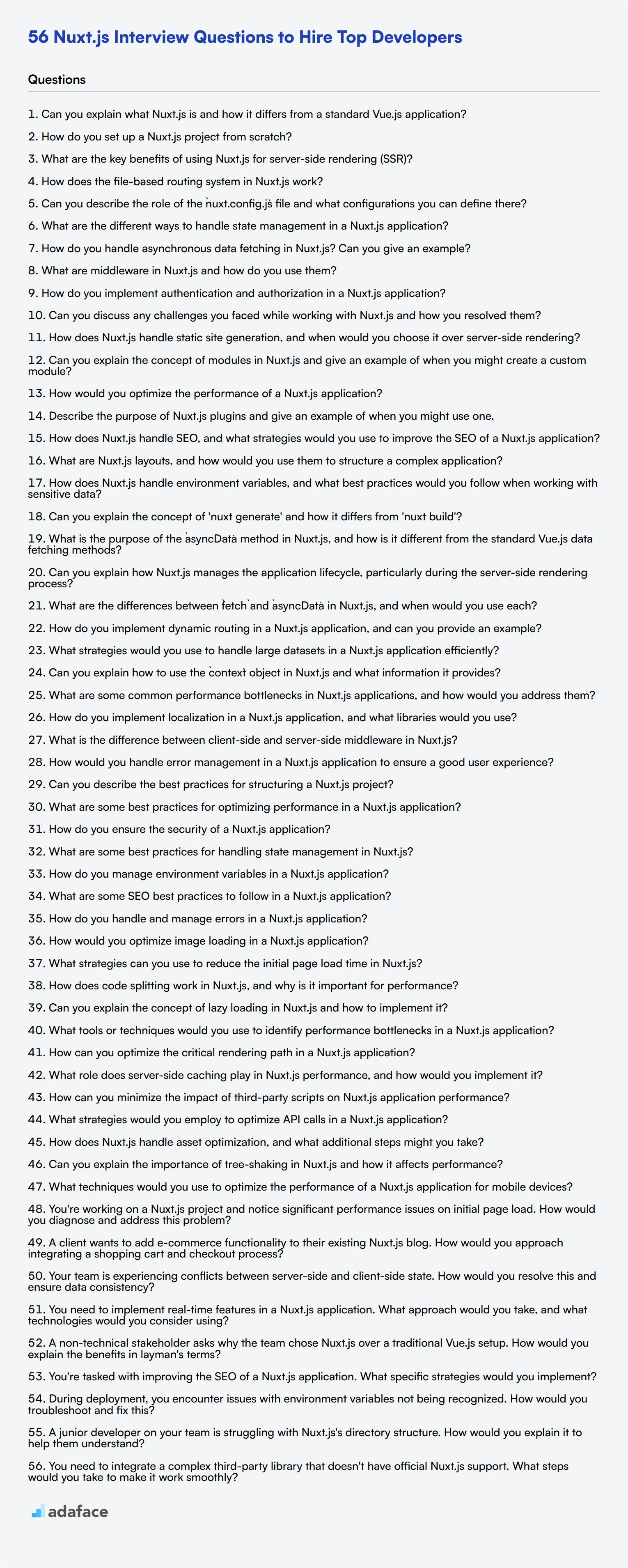Hiring the right Nuxt.js developer can be a challenge, especially when you're not sure what questions to ask during the interview process. A well-structured interview can help you identify candidates with the right skills and experience to contribute effectively to your team.
This blog post provides a comprehensive list of Nuxt.js interview questions tailored for different experience levels and specific areas of expertise. From basic concepts to advanced topics, we cover questions that will help you evaluate candidates' knowledge of Nuxt.js, Vue.js, and related front-end technologies.
By using these questions, you can make more informed hiring decisions and find developers who truly understand Nuxt.js. Consider combining these interview questions with a pre-screening assessment to streamline your hiring process and identify top talent efficiently.
Table of contents
10 common Nuxt.js interview questions to ask your applicants

To ensure you select the best candidate for your next Nuxt.js developer role, consider using these 10 common Nuxt.js interview questions. They are designed to evaluate a candidate's technical skills and hands-on experience with the framework, helping you make an informed hiring decision. For more details on what to look for in a front-end developer, check out this job description.
- Can you explain what Nuxt.js is and how it differs from a standard Vue.js application?
- How do you set up a Nuxt.js project from scratch?
- What are the key benefits of using Nuxt.js for server-side rendering (SSR)?
- How does the file-based routing system in Nuxt.js work?
- Can you describe the role of the `nuxt.config.js` file and what configurations you can define there?
- What are the different ways to handle state management in a Nuxt.js application?
- How do you handle asynchronous data fetching in Nuxt.js? Can you give an example?
- What are middleware in Nuxt.js and how do you use them?
- How do you implement authentication and authorization in a Nuxt.js application?
- Can you discuss any challenges you faced while working with Nuxt.js and how you resolved them?
8 Nuxt.js interview questions and answers to evaluate junior developers
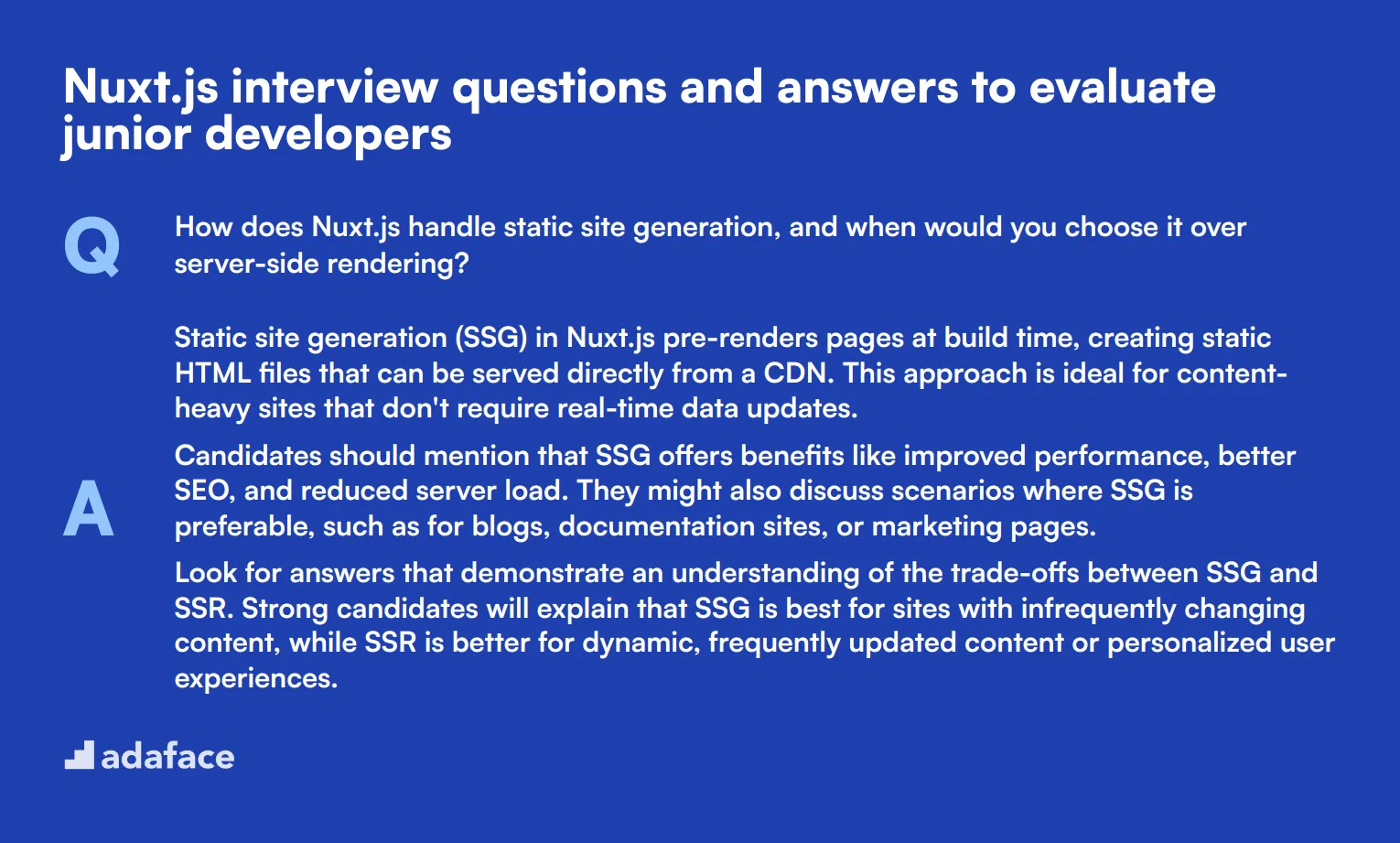
Ready to evaluate junior Nuxt.js developers? These 8 questions will help you assess their understanding of core concepts and practical application. Use this list to gauge candidates' knowledge and problem-solving skills during your next interview process. Remember, the goal is to find developers who can contribute effectively to your Nuxt.js projects from day one.
1. How does Nuxt.js handle static site generation, and when would you choose it over server-side rendering?
Static site generation (SSG) in Nuxt.js pre-renders pages at build time, creating static HTML files that can be served directly from a CDN. This approach is ideal for content-heavy sites that don't require real-time data updates.
Candidates should mention that SSG offers benefits like improved performance, better SEO, and reduced server load. They might also discuss scenarios where SSG is preferable, such as for blogs, documentation sites, or marketing pages.
Look for answers that demonstrate an understanding of the trade-offs between SSG and SSR. Strong candidates will explain that SSG is best for sites with infrequently changing content, while SSR is better for dynamic, frequently updated content or personalized user experiences.
2. Can you explain the concept of modules in Nuxt.js and give an example of when you might create a custom module?
Modules in Nuxt.js are reusable pieces of code that extend the framework's core functionality. They can add plugins, modify the build process, or inject content into the application.
A good answer should include examples of common modules like '@nuxtjs/axios' for HTTP requests or '@nuxtjs/pwa' for progressive web app features. Candidates might explain that custom modules are useful for encapsulating repeated configuration or adding company-specific functionality across multiple projects.
Look for responses that demonstrate practical thinking. An ideal candidate might suggest creating a custom module for integrating a specific API, implementing company-wide analytics, or managing environment-specific configurations across different Nuxt.js projects.
3. How would you optimize the performance of a Nuxt.js application?
Performance optimization in Nuxt.js involves several strategies. Candidates should mention techniques such as:
- Implementing code splitting to reduce initial load times
- Utilizing the 'asyncData' method for server-side data fetching
- Leveraging Nuxt's built-in image optimization
- Minimizing and compressing assets
- Using lazy loading for components and routes
- Employing caching strategies for both client and server
Strong answers will also touch on the importance of monitoring and measuring performance using tools like Lighthouse or the Vue DevTools. Look for candidates who understand that optimization is an ongoing process and can explain how they would identify and address performance bottlenecks in a Nuxt.js application.
4. Describe the purpose of Nuxt.js plugins and give an example of when you might use one.
Nuxt.js plugins are JavaScript files that run before instantiating the root Vue.js application. They're used to add global methods or properties, integrate external libraries, or set up global components.
Candidates might give examples such as:
- Creating a plugin for a custom authentication system
- Setting up a global event bus
- Integrating a third-party library like Lodash or Moment.js
- Implementing a global error handling mechanism
Look for answers that demonstrate an understanding of the plugin system's flexibility. Strong candidates will explain how plugins can be configured to run only on the client-side, server-side, or both, depending on the use case. They should also mention the importance of registering plugins in the nuxt.config.js file.
5. How does Nuxt.js handle SEO, and what strategies would you use to improve the SEO of a Nuxt.js application?
Nuxt.js provides built-in features to enhance SEO, primarily through its server-side rendering capabilities and the head method. Candidates should mention the following strategies:
- Utilizing the
headmethod in components or pages to dynamically set meta tags
- Implementing proper semantic HTML structure
- Using the
@nuxtjs/sitemapmodule to generate a sitemap
- Ensuring fast page load times through optimization techniques
- Implementing structured data using JSON-LD
- Creating dynamic
robots.txtfiles
Look for answers that show an understanding of both technical SEO aspects and content-related factors. Strong candidates might also mention the importance of server-side rendering for SEO and how Nuxt.js facilitates this out of the box. They should be able to explain how these strategies contribute to better search engine rankings and user experience.
6. What are Nuxt.js layouts, and how would you use them to structure a complex application?
Nuxt.js layouts are wrapper components that allow you to define a common structure for multiple pages. They're typically used for elements that remain consistent across different views, such as headers, footers, or navigation menus.
Candidates should explain that layouts are stored in the layouts directory and can be applied to pages using the layout property in the page component. They might discuss scenarios like:
- Creating a default layout for the main site structure
- Implementing separate layouts for authenticated and non-authenticated users
- Designing specific layouts for different sections of an application (e.g., admin panel, blog, e-commerce pages)
Look for answers that demonstrate an understanding of how layouts can improve code reusability and maintain consistency across an application. Strong candidates will also mention the ability to use dynamic layouts based on route parameters or user roles, showcasing their ability to design flexible and maintainable Nuxt.js applications.
7. How does Nuxt.js handle environment variables, and what best practices would you follow when working with sensitive data?
Nuxt.js uses the dotenv module to load environment variables from a .env file. Candidates should explain that these variables can be accessed through the process.env object in server-side code and the context.env object in client-side code.
Best practices for handling sensitive data include:
- Never committing
.envfiles to version control
- Using different
.envfiles for development, staging, and production environments
- Prefixing public variables with
NUXT_ENV_to make them available on the client-side
- Using server middleware or serverless functions to handle sensitive operations
- Implementing proper access controls and encryption for sensitive data
Look for answers that demonstrate an understanding of security concerns in web development. Strong candidates will emphasize the importance of keeping sensitive information server-side and discuss strategies for securely passing necessary data to the client. They might also mention tools like Vault or AWS Secrets Manager for managing secrets in production environments.
8. Can you explain the concept of 'nuxt generate' and how it differs from 'nuxt build'?
nuxt generate is used to create a static version of a Nuxt.js application, pre-rendering all pages to HTML files. This command is ideal for static site hosting or when you want to deploy your site to a CDN. On the other hand, nuxt build compiles the application for production but doesn't generate static files.
Key differences include:
nuxt generatecreates adistfolder with HTML files for each route
nuxt buildproduces a.nuxtdirectory with server and client bundles
- Generated sites can be hosted on static file servers, while built apps require a Node.js server
nuxt generateis suitable for content-heavy sites, whilenuxt buildis better for dynamic applications
Look for answers that demonstrate an understanding of when to use each command. Strong candidates will discuss the trade-offs between static site generation and server-side rendering, touching on factors like build time, hosting requirements, and the nature of the application's content. They might also mention the generate property in nuxt.config.js for customizing the static site generation process.
10 intermediate Nuxt.js interview questions and answers to ask mid-tier developers.
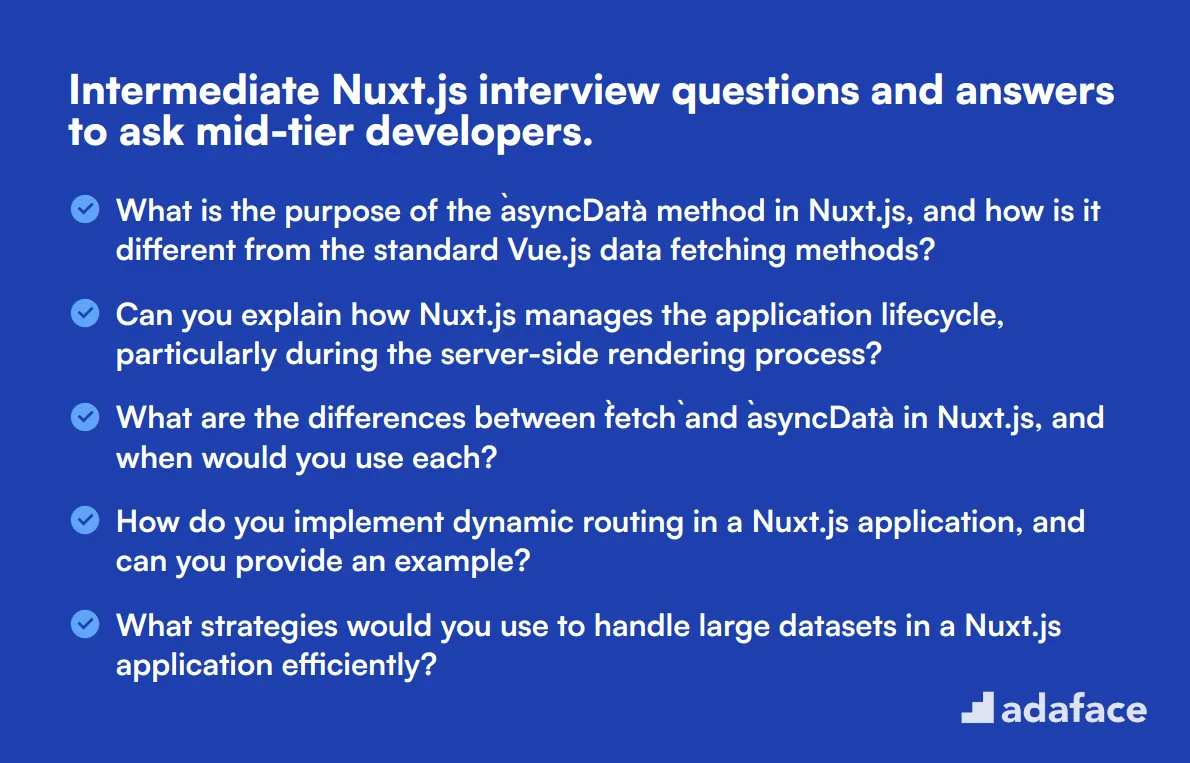
To evaluate whether candidates possess the necessary skills for a mid-tier role in Nuxt.js, consider using this list of intermediate interview questions. These questions can help you assess their technical understanding and practical experience, ensuring they fit well within your development team. For constructing a comprehensive interview, you might also explore Vue.js developer job descriptions to align expectations.
- What is the purpose of the `asyncData` method in Nuxt.js, and how is it different from the standard Vue.js data fetching methods?
- Can you explain how Nuxt.js manages the application lifecycle, particularly during the server-side rendering process?
- What are the differences between `fetch` and `asyncData` in Nuxt.js, and when would you use each?
- How do you implement dynamic routing in a Nuxt.js application, and can you provide an example?
- What strategies would you use to handle large datasets in a Nuxt.js application efficiently?
- Can you explain how to use the `context` object in Nuxt.js and what information it provides?
- What are some common performance bottlenecks in Nuxt.js applications, and how would you address them?
- How do you implement localization in a Nuxt.js application, and what libraries would you use?
- What is the difference between client-side and server-side middleware in Nuxt.js?
- How would you handle error management in a Nuxt.js application to ensure a good user experience?
7 Nuxt.js interview questions and answers related to best practices
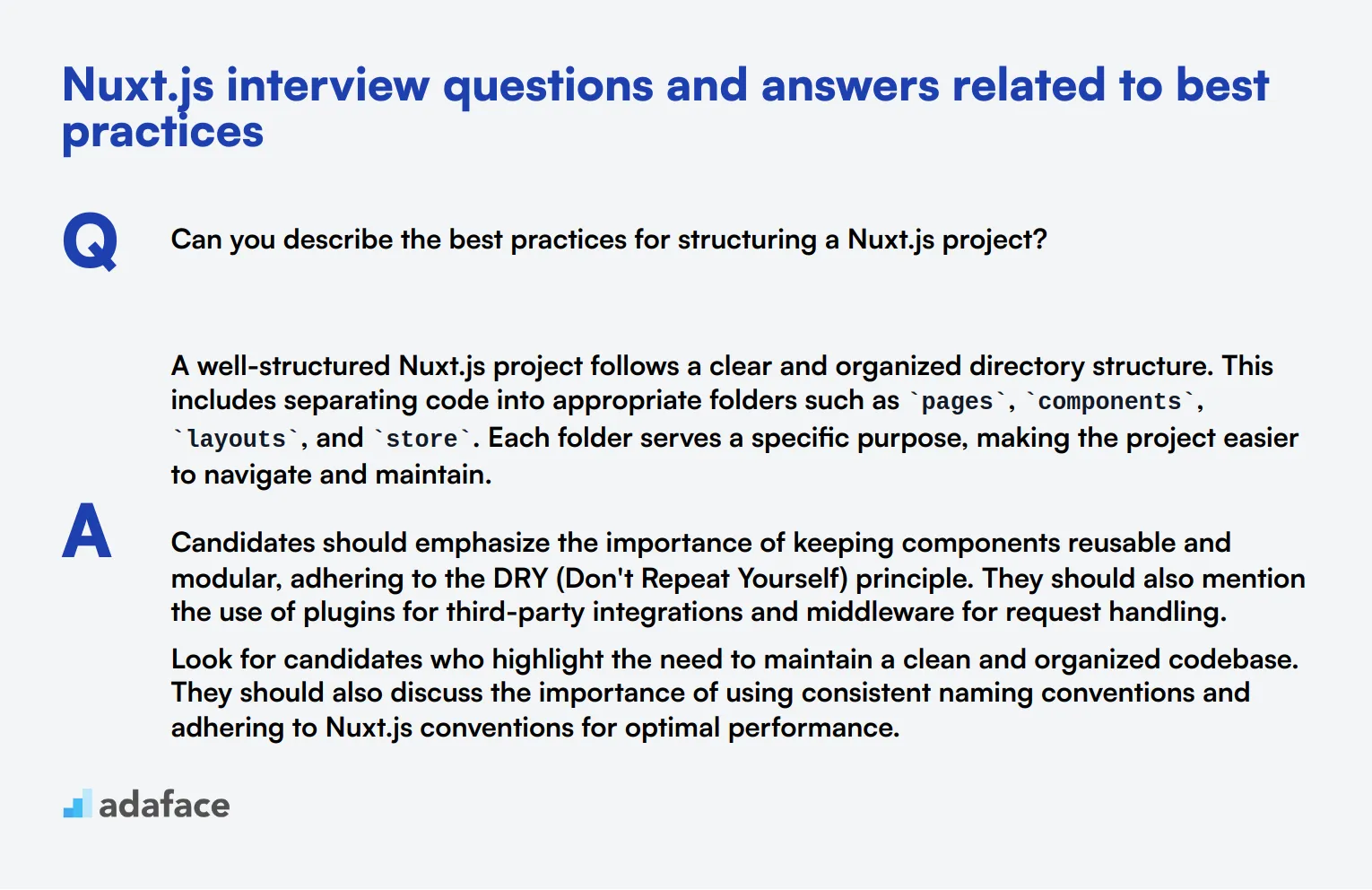
To ensure your candidates are well-versed in Nuxt.js best practices, ask them some of these essential interview questions. These questions will help you gauge their understanding and ability to apply best practices in their projects, ensuring they can deliver optimal performance and maintainability.
1. Can you describe the best practices for structuring a Nuxt.js project?
A well-structured Nuxt.js project follows a clear and organized directory structure. This includes separating code into appropriate folders such as pages, components, layouts, and store. Each folder serves a specific purpose, making the project easier to navigate and maintain.
Candidates should emphasize the importance of keeping components reusable and modular, adhering to the DRY (Don't Repeat Yourself) principle. They should also mention the use of plugins for third-party integrations and middleware for request handling.
Look for candidates who highlight the need to maintain a clean and organized codebase. They should also discuss the importance of using consistent naming conventions and adhering to Nuxt.js conventions for optimal performance.
2. What are some best practices for optimizing performance in a Nuxt.js application?
To optimize performance in a Nuxt.js application, candidates should mention techniques such as code splitting, lazy loading, and server-side rendering. Code splitting allows for loading only the necessary code for a given page, reducing initial load times.
Lazy loading components and images can further enhance performance by loading resources only when they are needed. Additionally, server-side rendering helps in rendering pages on the server before sending them to the client, resulting in faster page loads.
Candidates should also discuss the importance of using performance monitoring tools and regularly auditing the application. Look for answers that include strategies like minimizing third-party dependencies and optimizing images and assets.
3. How do you ensure the security of a Nuxt.js application?
Ensuring the security of a Nuxt.js application involves implementing several best practices such as input validation, proper authentication and authorization, and securing API endpoints. Input validation helps prevent common attacks like SQL injection and cross-site scripting (XSS).
Using secure authentication methods, such as OAuth or JWT, and implementing role-based access control can help protect sensitive data and resources. Additionally, candidates should mention the importance of using HTTPS and securing API endpoints with proper authentication and rate limiting.
Look for candidates who understand the importance of regular security audits and staying updated with the latest security patches and vulnerabilities. They should also highlight the need for secure coding practices and using security-focused libraries and tools.
4. What are some best practices for handling state management in Nuxt.js?
Handling state management in Nuxt.js can be efficiently managed using Vuex, the state management library for Vue.js. Candidates should mention the importance of organizing the store into modules, keeping state, mutations, actions, and getters in separate files for better maintainability.
They should also highlight the use of namespaced modules to avoid conflicts and improve code readability. Using plugins like nuxt-persistedstate can help in persisting state across page reloads, enhancing the user experience.
Look for answers that emphasize the importance of keeping the state minimal and only storing data that is necessary for the application. Candidates should also discuss strategies for avoiding state mutations directly in components and using centralized state management through Vuex.
5. How do you manage environment variables in a Nuxt.js application?
Managing environment variables in a Nuxt.js application involves using the .env file and the @nuxtjs/dotenv module. Candidates should explain how to define environment variables in the .env file and access them in the nuxt.config.js file using process.env.
They should also mention the importance of keeping sensitive data, such as API keys and secrets, out of the source code and using environment variables for configuration. This helps in maintaining security and flexibility across different environments.
Look for candidates who understand the importance of using environment variables to manage configuration settings and who can discuss strategies for handling different environments, such as development, staging, and production.
6. What are some SEO best practices to follow in a Nuxt.js application?
SEO best practices in a Nuxt.js application include using server-side rendering to ensure search engines can crawl and index the content. Candidates should also mention the use of meta tags and structured data to provide search engines with relevant information about the pages.
They should discuss the importance of optimizing page load times, using descriptive URLs, and ensuring the site is mobile-friendly. Additionally, implementing canonical tags and handling redirects properly can help in avoiding duplicate content issues.
Look for candidates who understand the importance of regular SEO audits and staying updated with the latest SEO best practices. They should also highlight the use of tools like Google Search Console to monitor and improve the site's SEO performance.
7. How do you handle and manage errors in a Nuxt.js application?
Handling and managing errors in a Nuxt.js application involves using error boundaries and global error handling mechanisms. Candidates should explain how to create custom error pages and use the error method in async data fetching functions to handle errors gracefully.
They should also mention the importance of logging errors and monitoring application performance using tools like Sentry or LogRocket. This helps in identifying and resolving issues proactively.
Look for candidates who understand the importance of providing meaningful error messages to users and ensuring a smooth user experience. They should also discuss strategies for handling different types of errors, such as network errors, server errors, and client-side errors.
12 Nuxt.js interview questions about performance optimization
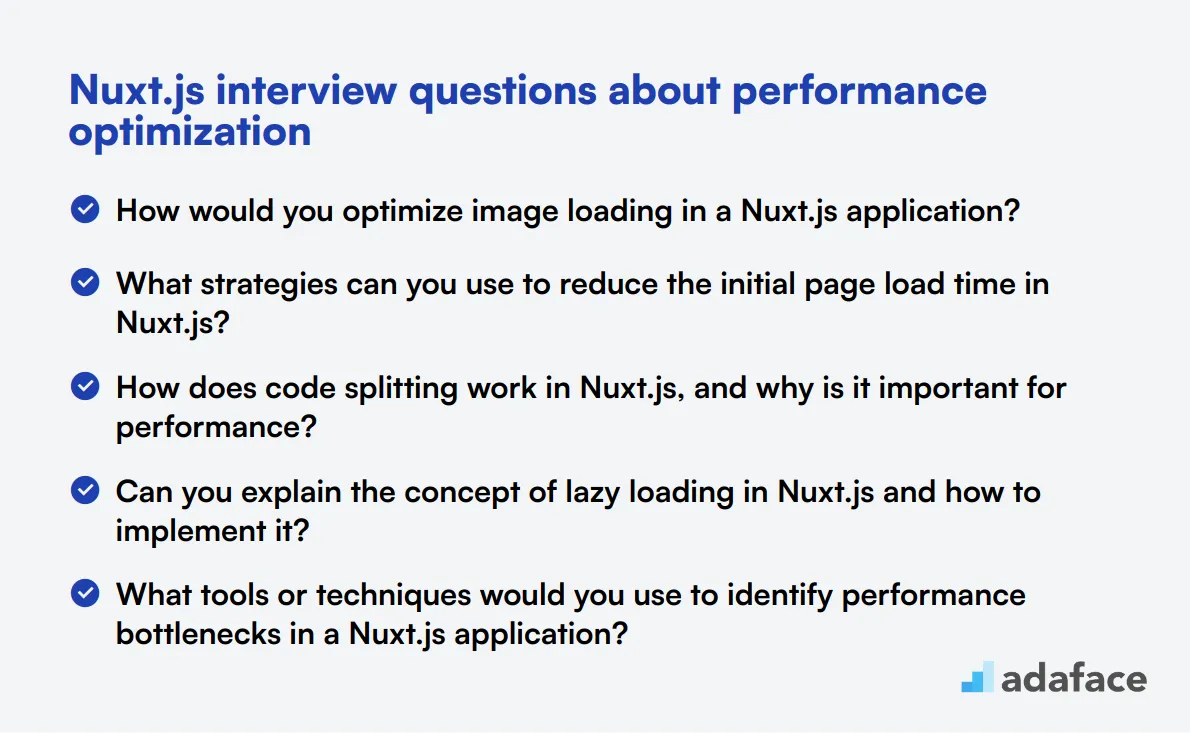
To assess a candidate's expertise in optimizing Nuxt.js applications, consider using these 12 performance-focused interview questions. These queries will help you evaluate a Vue.js developer's understanding of Nuxt.js performance best practices and their ability to create efficient, high-performing applications.
- How would you optimize image loading in a Nuxt.js application?
- What strategies can you use to reduce the initial page load time in Nuxt.js?
- How does code splitting work in Nuxt.js, and why is it important for performance?
- Can you explain the concept of lazy loading in Nuxt.js and how to implement it?
- What tools or techniques would you use to identify performance bottlenecks in a Nuxt.js application?
- How can you optimize the critical rendering path in a Nuxt.js application?
- What role does server-side caching play in Nuxt.js performance, and how would you implement it?
- How can you minimize the impact of third-party scripts on Nuxt.js application performance?
- What strategies would you employ to optimize API calls in a Nuxt.js application?
- How does Nuxt.js handle asset optimization, and what additional steps might you take?
- Can you explain the importance of tree-shaking in Nuxt.js and how it affects performance?
- What techniques would you use to optimize the performance of a Nuxt.js application for mobile devices?
9 situational Nuxt.js interview questions for hiring top developers
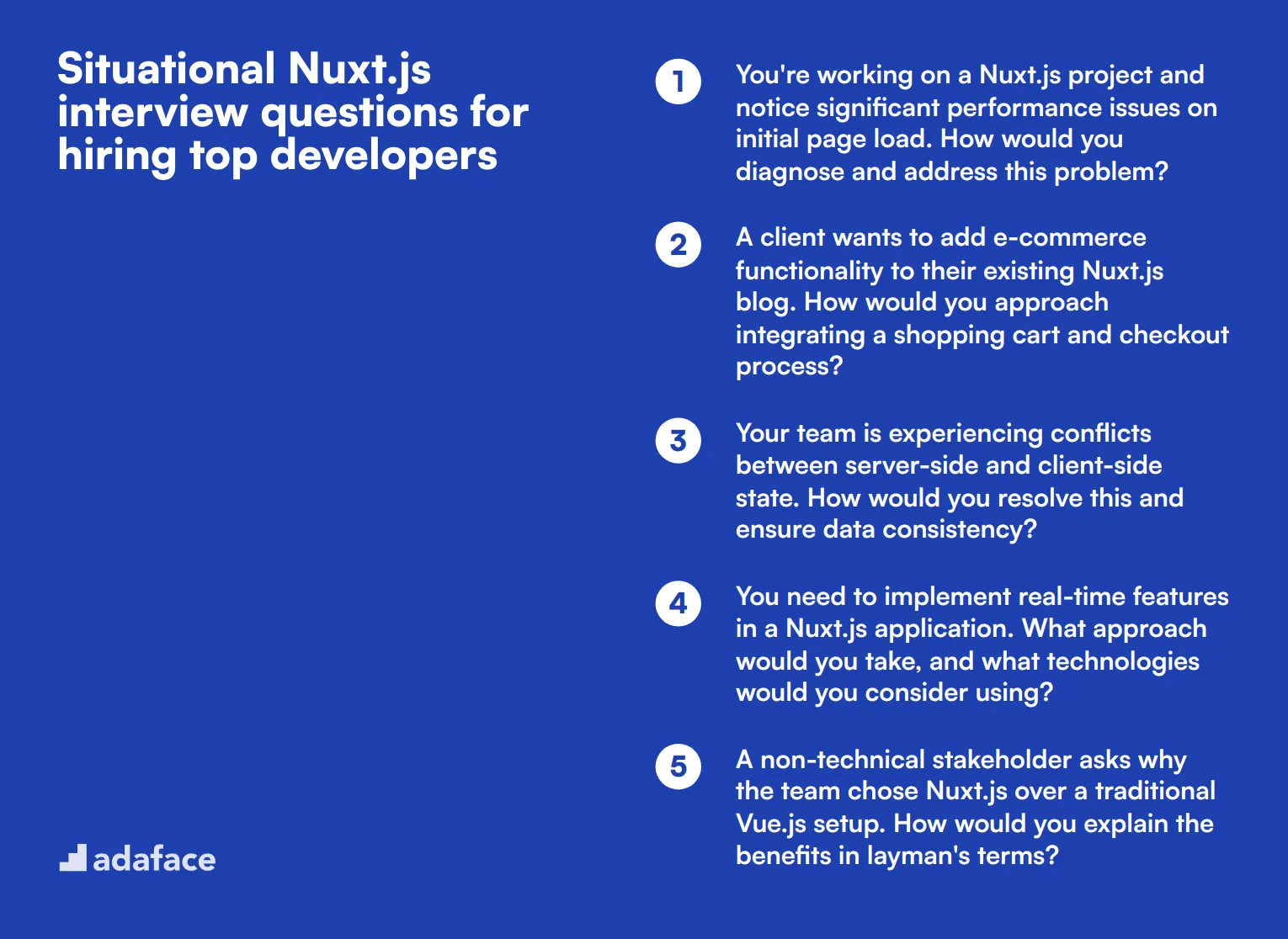
To assess a candidate's ability to handle real-world scenarios using Nuxt.js, consider asking these situational interview questions. These questions will help you evaluate a JavaScript developer's problem-solving skills and their practical experience with Nuxt.js in various contexts.
- You're working on a Nuxt.js project and notice significant performance issues on initial page load. How would you diagnose and address this problem?
- A client wants to add e-commerce functionality to their existing Nuxt.js blog. How would you approach integrating a shopping cart and checkout process?
- Your team is experiencing conflicts between server-side and client-side state. How would you resolve this and ensure data consistency?
- You need to implement real-time features in a Nuxt.js application. What approach would you take, and what technologies would you consider using?
- A non-technical stakeholder asks why the team chose Nuxt.js over a traditional Vue.js setup. How would you explain the benefits in layman's terms?
- You're tasked with improving the SEO of a Nuxt.js application. What specific strategies would you implement?
- During deployment, you encounter issues with environment variables not being recognized. How would you troubleshoot and fix this?
- A junior developer on your team is struggling with Nuxt.js's directory structure. How would you explain it to help them understand?
- You need to integrate a complex third-party library that doesn't have official Nuxt.js support. What steps would you take to make it work smoothly?
Which Nuxt.js skills should you evaluate during the interview phase?
While it's impossible to assess every facet of a candidate's abilities in a single interview, focusing on key Nuxt.js skills can give you a good sense of their proficiency and potential. Here are the essential skills you should evaluate during the interview phase to ensure you hire a capable Nuxt.js developer.
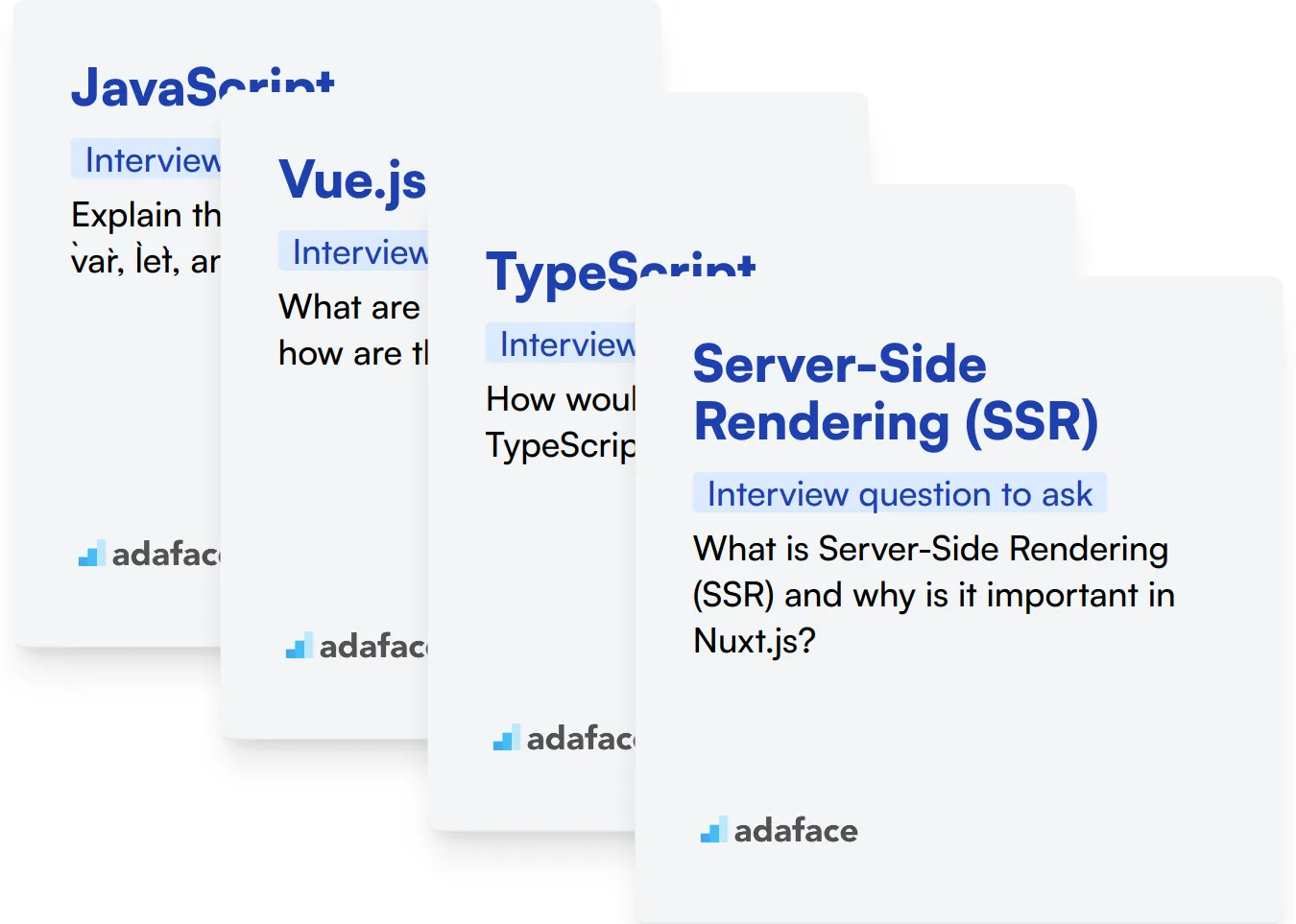
JavaScript
JavaScript is the backbone of any Nuxt.js application. A strong grasp of JavaScript fundamentals enables developers to build dynamic and interactive web applications, making it a crucial skill for Nuxt.js development.
Consider using an assessment test like the JavaScript online test to filter candidates with strong JavaScript skills through relevant MCQs.
You can also ask targeted interview questions to judge a candidate's JavaScript proficiency. Here’s one such question:
Explain the difference between var, let, and const in JavaScript.
Look for candidates who can clearly articulate the differences, along with their scopes and use-cases. This will indicate their understanding of JavaScript fundamentals.
Vue.js
Nuxt.js is built on Vue.js, so a deep understanding of Vue.js is essential for any Nuxt.js developer. It’s important for developers to know how to structure applications, manage state, and build reusable components using Vue.js.
Leverage a test like the Vue.js assessment test to evaluate candidates on their Vue.js skills through relevant multiple-choice questions.
To dig deeper into their Vue.js knowledge, you might ask:
What are Vue.js directives and how are they used?
Candidates should provide detailed explanations and examples of how directives are used in Vue.js, indicating practical experience.
TypeScript
While not mandatory, TypeScript is increasingly used with Nuxt.js for its ability to catch type errors at compile-time. Knowledge of TypeScript can boost productivity and reduce bugs, making it a valuable addition.
You can use the TypeScript online assessment to measure a candidate's proficiency with TypeScript through relevant questions.
In an interview, you could ask:
How would you integrate TypeScript into a Nuxt.js project?
Expect candidates to discuss module installation, configuration in nuxt.config.js, and TypeScript support in single-file components. This shows their hands-on experience and understanding of TypeScript integration.
Server-Side Rendering (SSR)
Nuxt.js excels at Server-Side Rendering (SSR), which improves SEO and initial page load performance. Understanding SSR is key for building high-performance Nuxt.js applications.
Targeted questions about SSR can help gauge their expertise. For instance, you might ask:
What is Server-Side Rendering (SSR) and why is it important in Nuxt.js?
Look for an understanding of how SSR works, its benefits for SEO and performance, and how it's implemented in Nuxt.js. This will indicate their grasp of this critical feature.
Strategic Approaches for Leveraging Nuxt.js Interview Questions
As you gear up to employ the interview questions gathered in this guide, here are several strategic tips to effectively utilize them in your hiring process.
1. Incorporate Skill Assessments Prior to Interviews
Using skill tests before conducting interviews can significantly streamline the candidate evaluation process. These tests help filter candidates based on essential technical skills, ensuring that only the most qualified individuals proceed to the interview stage.
For Nuxt.js roles, consider utilizing tests from Adaface such as the Nuxt.js test or the Vue.js assessment test. These assessments provide a detailed insight into the candidates' practical skills and theoretical knowledge.
Implementing these tests can save significant interview time and allows you to focus on deeper aspects of candidate evaluation, such as problem-solving abilities and cultural fit. Transitioning to the next tip, let's consider how to optimize the interview itself.
2. Carefully Compile Your Interview Questions
Given the limited time in interviews, selecting the right questions is key to effectively assess critical competencies. Focus on questions that reflect the core requirements of the Nuxt.js role.
Beyond Nuxt.js, it's beneficial to integrate questions that assess other relevant skills. For instance, consider including JavaScript and Vue.js related questions, as they are pertinent to Nuxt.js developers. This approach ensures a holistic assessment of the candidate's abilities.
3. Emphasize Follow-Up Questions
Merely asking the right interview questions isn't sufficient; follow-up questions are essential for digging deeper into the candidate’s responses. They help in uncovering genuine skill levels and ensuring that the candidate's knowledge is comprehensive.
For example, if a candidate mentions using Nuxt.js for server-side rendering, a good follow-up would be asking about specific projects where they implemented this and the challenges faced. This helps gauge the depth of their experience and how they tackle real-world problems.
Use Nuxt.js interview questions and skills tests to hire talented developers
When looking to hire someone with Nuxt.js skills, it's important to ensure they possess the necessary expertise. The most accurate way to gauge this is by utilizing skill tests. Consider using our Nuxt.js test for a comprehensive evaluation.
After administering the test, you'll be able to shortlist the best applicants for interviews. To get started, sign up on our assessment platform and streamline your hiring process.
NuxtJS Test
Download Nuxt.js interview questions template in multiple formats
Nuxt.js Interview Questions FAQs
Questions often cover the basics of Nuxt.js, component lifecycle, and common use-cases.
Ask them about basic concepts and simple coding tasks to gauge their understanding and hands-on skills.
Evaluate their experience with intermediate concepts like middleware, SSR, and plugins.
Inquire about their knowledge of coding standards, project structuring, and optimization techniques.
Present scenarios involving debugging, performance optimization, or migration and ask how they would handle them.
Understanding their strategies for optimizing performance can help ensure the application runs smoothly and efficiently.

40 min skill tests.
No trick questions.
Accurate shortlisting.
We make it easy for you to find the best candidates in your pipeline with a 40 min skills test.
Try for freeRelated posts
Free resources




